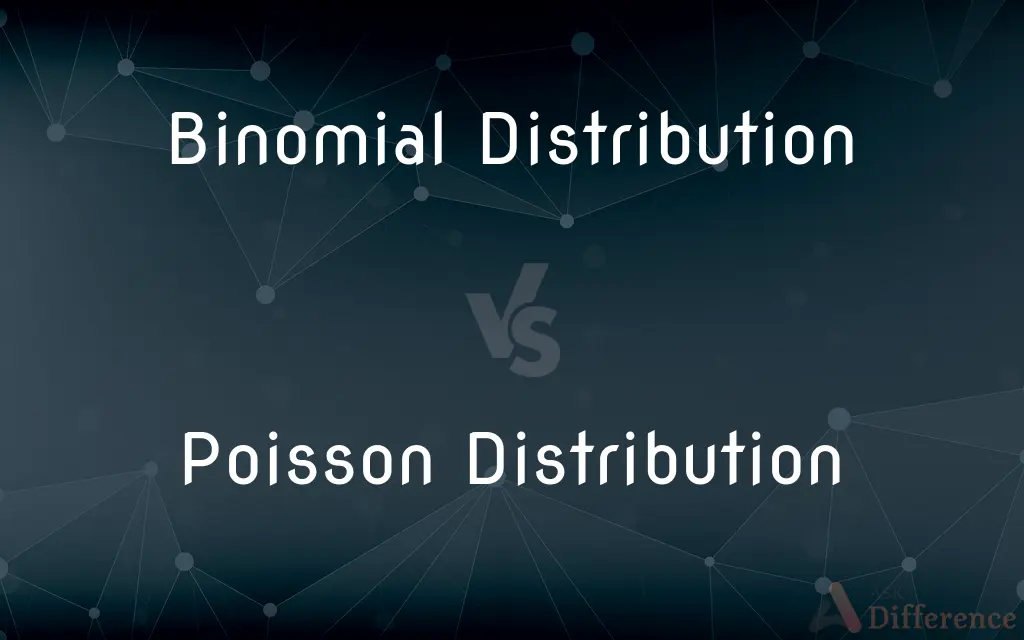Binomial Distribution vs. Poisson Distribution — What's the Difference?
Edited by Tayyaba Rehman — By Fiza Rafique — Published on December 24, 2023
Binomial Distribution models the number of successes in a fixed number of independent Bernoulli trials, while Poisson Distribution estimates the number of rare events over a fixed interval.

Difference Between Binomial Distribution and Poisson Distribution
Table of Contents
ADVERTISEMENT
Key Differences
Binomial Distribution is a probability distribution that models the outcomes of a fixed number of independent Bernoulli trials. Poisson Distribution, in contrast, represents the probability of a given number of events occurring in a fixed interval of time or space.
The Binomial Distribution focuses on successes and failures with a known probability of success in each trial. The Poisson Distribution, however, models rare events regardless of the number of opportunities and is more concerned with the average number of events in the given interval.
For Binomial Distribution, there are two possible outcomes in each trial, typically labeled as "success" and "failure". For the Poisson Distribution, the emphasis is on the number of times an event occurs within the observed interval, with no limit to the number of occurrences.
While Binomial Distribution requires knowledge of the probability of success and the number of trials, Poisson Distribution primarily relies on the average rate of events.
Comparison Chart
Basis
Fixed number of Bernoulli trials
Fixed interval of time or space
ADVERTISEMENT
Primary Parameter(s)
Probability of success and number of trials
Average rate of events
Number of Outcomes
Two (success or failure)
Infinite (number of occurrences of an event)
Typical Use
Situations with a known probability of success
Rare events with a known average rate but no fixed number of trials
Compare with Definitions
Binomial Distribution
Binomial Distribution models scenarios with a constant probability of success.
The likelihood of hitting a target 6 times out of 10 tries is modeled by a Binomial Distribution.
Poisson Distribution
Poisson Distribution doesn't require a fixed number of trials.
Predicting the number of calls to a helpline in an hour can be modeled using a Poisson Distribution.
Binomial Distribution
Binomial Distribution considers two possible outcomes.
The distribution of pass/fail outcomes in a test is a Binomial Distribution.
Poisson Distribution
Poisson Distribution models the number of rare events in a fixed interval.
The number of earthquakes in a region over a year can be modeled using a Poisson Distribution.
Binomial Distribution
Binomial Distribution represents outcomes of fixed Bernoulli trials.
Tossing a fair coin 10 times follows a Binomial Distribution.
Poisson Distribution
Poisson Distribution is a discrete distribution.
The number of emails received in a day can be estimated with a Poisson Distribution.
Binomial Distribution
Binomial Distribution has a known probability of success.
Predicting the number of heads in 5 coin tosses uses a Binomial Distribution.
Poisson Distribution
Poisson Distribution is useful when events are rare.
The occurrence of printing errors on a page follows a Poisson Distribution.
Binomial Distribution
Binomial Distribution is discrete and finite.
The chance of getting 3 correct answers in a 4-question true/false quiz follows a Binomial Distribution.
Poisson Distribution
Poisson Distribution relies on an average rate of events.
The distribution of meteor sightings in a month follows a Poisson Distribution based on the average rate.
Common Curiosities
Does Binomial Distribution have a fixed number of trials?
Yes, Binomial Distribution is based on a fixed number of trials.
In what situations is Poisson Distribution typically used?
It's used to model the number of rare events in a fixed interval, like the number of calls to a call center in an hour.
What is a Binomial Distribution?
A Binomial Distribution models the outcomes of a fixed number of independent Bernoulli trials.
Can you give an example of Binomial Distribution?
Predicting the number of heads in 10 coin tosses is an example of Binomial Distribution.
What's the primary parameter for Poisson Distribution?
The average rate of events in the observed interval.
What are the main parameters of Binomial Distribution?
The number of trials and the probability of success in each trial.
How does Poisson Distribution differ from Binomial Distribution?
Poisson Distribution estimates the number of events over a fixed interval, especially for rare events, while Binomial Distribution focuses on a fixed number of trials.
In which distribution is the number of trials not fixed?
In the Poisson Distribution, the number of trials is not fixed.
Can Binomial Distribution model rare events?
While it can model any event with two outcomes, Poisson is typically more suited for rare events.
Which distribution should I use to model the number of heads in 100 coin flips?
You should use the Binomial Distribution for this scenario.
Can Poisson Distribution model more than two outcomes?
Poisson focuses on the number of occurrences of a single type of event, not the type of outcomes.
Is there a limit to the number of events in Poisson Distribution?
No, Poisson Distribution can model an infinite number of events in a given interval.
How many outcomes are possible in a Binomial Distribution?
Two, typically "success" and "failure."
Is the probability of success constant in Binomial Distribution?
Yes, the probability remains constant across trials.
Share Your Discovery

Previous Comparison
Constitutional Isomers vs. Stereoisomers
Next Comparison
Line vs. Line & Staff OrganizationAuthor Spotlight
Written by
Fiza RafiqueFiza Rafique is a skilled content writer at AskDifference.com, where she meticulously refines and enhances written pieces. Drawing from her vast editorial expertise, Fiza ensures clarity, accuracy, and precision in every article. Passionate about language, she continually seeks to elevate the quality of content for readers worldwide.
Edited by
Tayyaba RehmanTayyaba Rehman is a distinguished writer, currently serving as a primary contributor to askdifference.com. As a researcher in semantics and etymology, Tayyaba's passion for the complexity of languages and their distinctions has found a perfect home on the platform. Tayyaba delves into the intricacies of language, distinguishing between commonly confused words and phrases, thereby providing clarity for readers worldwide.











































